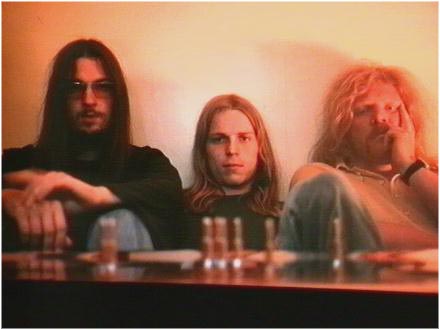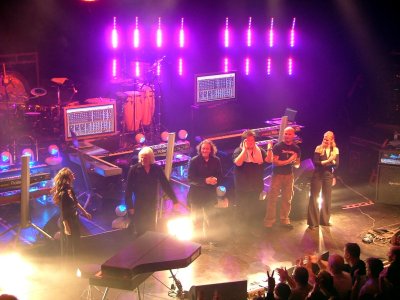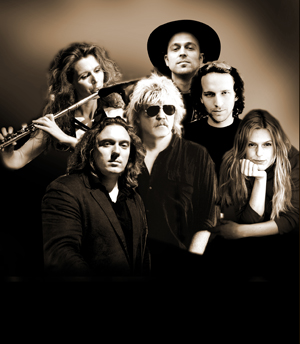| B i o g r a p h y |
 Tangerine Dream
is a German electronic music group founded in 1967 by Edgar Froese. The band has undergone
several personnel changes over the years, with Froese the only
continuous member. Drummer and composer Klaus Schulze
was a member of an early lineup, but the most stable version of the
group during their influential mid-1970s period was as a keyboard trio
with Froese, Christopher Franke,
and Peter Baumann. Early in
the 1980s, Johannes Schmoelling
replaced Baumann, and this lineup, too, was stable and extremely
productive. Tangerine Dream's early "Pink Years" albums had a pivotal
role in the development of Krautrock. Their "Virgin Years" and later
albums became a defining influence in New Age music, although the band
themselves dislike the term. Although the group has released numerous
studio and live recordings, a substantial number of their fans were
introduced to Tangerine Dream by their film soundtracks, which numbers
over sixty and includes Sorcerer, Thief, The Keep, Risky Business,
Firestarter, Legend, Near Dark, and Miracle Mile.
Tangerine Dream
is a German electronic music group founded in 1967 by Edgar Froese. The band has undergone
several personnel changes over the years, with Froese the only
continuous member. Drummer and composer Klaus Schulze
was a member of an early lineup, but the most stable version of the
group during their influential mid-1970s period was as a keyboard trio
with Froese, Christopher Franke,
and Peter Baumann. Early in
the 1980s, Johannes Schmoelling
replaced Baumann, and this lineup, too, was stable and extremely
productive. Tangerine Dream's early "Pink Years" albums had a pivotal
role in the development of Krautrock. Their "Virgin Years" and later
albums became a defining influence in New Age music, although the band
themselves dislike the term. Although the group has released numerous
studio and live recordings, a substantial number of their fans were
introduced to Tangerine Dream by their film soundtracks, which numbers
over sixty and includes Sorcerer, Thief, The Keep, Risky Business,
Firestarter, Legend, Near Dark, and Miracle Mile.
In the late 60s and early 70s, several short-lived incarnations of Tangerine Dream were formed by Froese teaming up with various musicians from West Berlin's underground scene. A few of these collaborators included Steve Jolliffe, Klaus Schulze and Conrad Schnitzler. The most notable of Froese's collaborations ended up being his partnership with Christopher Franke. Franke joined Tangerine Dream in 1970 from the group Agitation Free to replace Schulze as the drummer, and eventually (together with Peter Baumann, whose sequencer work is often mislabelled as 'all' Franke's work) became Tangerine Dream's sequencer guru and was responsible for some of the pulsing rhythmic synthesizer lines that came to define the band's music. Franke left Tangerine Dream over creative differences with Froese nearly two decades later in 1987. Other long-term members of the group included Peter Baumann (1971-1977), who later went on to found the New Age label Private Music, to which the band was signed from 1988 to 1991; Johannes Schmoelling (1980-1985); Paul Haslinger (1986-1990); and, most recently (1990 onwards), Froese's son Jerome. A number of other members were also part of Tangerine Dream for shorter periods of time. In contrast to session musicians, they also contributed to some compositions of the band during their stay. The five most notable such members are Steve Schroyder (organist, 1971-72), Michael Hoenig (who replaced Baumann for a 1975 Australian tour and a London concert, included on Bootleg Box Set Vol. 1), Steve Jolliffe (wind instruments and vocals on Cyclone and the following tour; was also part of a short-lived 1969 line-up), Ralf Wadephul (in collaboration with Edgar Froese recorded album Blue Dawn, but it was released only in 2006; also credited for one track on Optical Race (1988) and toured with the band in support of this album), and Linda Spa (saxophonist who appeared on numerous albums and concerts between 1990 and 1996, as well as 2005 onwards). As of 2007 Tangerine Dream comprises Edgar Froese, with the collaboration of Thorsten Quaeschning, who helped in the composition of Jeanne D'Arc (album) (2005) and Madcap's Flaming Duty (2007) with Chris Hausl on vocals. For concerts and recordings they are joined mainly by Iris Camaa and Linda Spa.
 West
Berlin in the mid-1960s to study art. He worked as a sculptor and
studied under Salvador Dalí, among others. His first band, the
R&B-styled The Ones, was gradually dismantled after releasing only
one single, and Froese turned to experimentation, playing minor gigs
with a variety of musicians. Most of these gigs were in the famous
Zodiak Free Arts Lab, although Froese's band was also invited to play
for his former teacher Dalí. Music was mixed with literature, painting,
early forms of multimedia, and more. Only the most outlandish ideas
attracted any attention, and Froese summed up this attitude with the
phrase: "In the absurd often lies what is artistically possible". As
members of the group came and went, the direction of the music
continued to be inspired by the Surrealists, and the group came to be
called by the surreal-sounding name of Tangerine Dream (prior to this
the group had sometimes gone under the title of The Tangerines
Psychedlic Light Dreams or the Tangerine Dream band). Froese was
fascinated by technology and skilled in using it to create music. He
built custom-made instruments and, wherever he went, collected sounds
with tape recorders for use in constructing musical works later. His
early work with tape loops and other repeating sounds was the obvious
precursor to the emerging technology of the sequencer, which Tangerine
Dream quickly adopted upon its arrival. The first Tangerine Dream
album, Electronic Meditation, was a tape-collage Krautrock piece, using
the technology of the time rather than the synthesized music they later
became famous for, and was a collaboration between Froese, Klaus
Schulze, and Conrad Schnitzler. Electronic Meditation was published by
Ohr in 1970, and began the period known as the Pink Years (the Ohr logo
was a pink ear). But starting with their second album, Alpha Centauri,
the group has been a trio or occasionally duo of electronic
instruments, commonly augmented by guitar from Froese (or, much later,
other musicians as well), and occasionally also other instruments. Of
these, drums from Chris Franke and organ from Steve Schroyder (on Alpha
Centauri) or Peter Baumann (on subsequent releases) feature prominently
in the band's music during the early 70s. They also started their
particularly heavy usage of the Mellotron during this period.
West
Berlin in the mid-1960s to study art. He worked as a sculptor and
studied under Salvador Dalí, among others. His first band, the
R&B-styled The Ones, was gradually dismantled after releasing only
one single, and Froese turned to experimentation, playing minor gigs
with a variety of musicians. Most of these gigs were in the famous
Zodiak Free Arts Lab, although Froese's band was also invited to play
for his former teacher Dalí. Music was mixed with literature, painting,
early forms of multimedia, and more. Only the most outlandish ideas
attracted any attention, and Froese summed up this attitude with the
phrase: "In the absurd often lies what is artistically possible". As
members of the group came and went, the direction of the music
continued to be inspired by the Surrealists, and the group came to be
called by the surreal-sounding name of Tangerine Dream (prior to this
the group had sometimes gone under the title of The Tangerines
Psychedlic Light Dreams or the Tangerine Dream band). Froese was
fascinated by technology and skilled in using it to create music. He
built custom-made instruments and, wherever he went, collected sounds
with tape recorders for use in constructing musical works later. His
early work with tape loops and other repeating sounds was the obvious
precursor to the emerging technology of the sequencer, which Tangerine
Dream quickly adopted upon its arrival. The first Tangerine Dream
album, Electronic Meditation, was a tape-collage Krautrock piece, using
the technology of the time rather than the synthesized music they later
became famous for, and was a collaboration between Froese, Klaus
Schulze, and Conrad Schnitzler. Electronic Meditation was published by
Ohr in 1970, and began the period known as the Pink Years (the Ohr logo
was a pink ear). But starting with their second album, Alpha Centauri,
the group has been a trio or occasionally duo of electronic
instruments, commonly augmented by guitar from Froese (or, much later,
other musicians as well), and occasionally also other instruments. Of
these, drums from Chris Franke and organ from Steve Schroyder (on Alpha
Centauri) or Peter Baumann (on subsequent releases) feature prominently
in the band's music during the early 70s. They also started their
particularly heavy usage of the Mellotron during this period.
 The
band's 1973 album Atem was named as Album of the Year by British DJ
John Peel, and this attention helped Tangerine Dream to sign to the
fledgling Virgin Records in the same year. Soon afterward they released
the album Phaedra, an eerie soundscape that unexpectedly reached #15 in
the United Kingdom album charts and became one of Virgin's first
bona-fide hits. Phaedra was the first commercial album to feature
sequencers and came to define much more than just the band's own sound.
The creation of the album's title track was something of a fluke; the
band was experimenting in the studio with a recently-acquired Moog
synthesizer, and the tape happened to be rolling at the time. They kept
the results and later added flute, bass-guitar and Mellotron
performances. The cantankerous Moog, like many other early
synthesizers, was so sensitive to changes in temperature that its
oscillators would drift badly in tuning as the equipment warmed up, and
this drift can easily be heard on the final recording. This album
marked the beginning of the period known as the Virgin Years. In the
1980s, along with other electronic music pioneers such as Jean Michel
Jarre and Vangelis, the band were early adopters of the new digital
technology which revolutionized the sound of the synthesiser. Their
technical competence and extensive experience in their early years with
self-made instruments and unusual means of creating sounds meant that
they were able to exploit this new technology to make music quite
unlike anything heard before. To the modern listener, their albums of
that period may not seem so exceptional, but only because the
technology they adopted at that time is now used almost universally.
The
band's 1973 album Atem was named as Album of the Year by British DJ
John Peel, and this attention helped Tangerine Dream to sign to the
fledgling Virgin Records in the same year. Soon afterward they released
the album Phaedra, an eerie soundscape that unexpectedly reached #15 in
the United Kingdom album charts and became one of Virgin's first
bona-fide hits. Phaedra was the first commercial album to feature
sequencers and came to define much more than just the band's own sound.
The creation of the album's title track was something of a fluke; the
band was experimenting in the studio with a recently-acquired Moog
synthesizer, and the tape happened to be rolling at the time. They kept
the results and later added flute, bass-guitar and Mellotron
performances. The cantankerous Moog, like many other early
synthesizers, was so sensitive to changes in temperature that its
oscillators would drift badly in tuning as the equipment warmed up, and
this drift can easily be heard on the final recording. This album
marked the beginning of the period known as the Virgin Years. In the
1980s, along with other electronic music pioneers such as Jean Michel
Jarre and Vangelis, the band were early adopters of the new digital
technology which revolutionized the sound of the synthesiser. Their
technical competence and extensive experience in their early years with
self-made instruments and unusual means of creating sounds meant that
they were able to exploit this new technology to make music quite
unlike anything heard before. To the modern listener, their albums of
that period may not seem so exceptional, but only because the
technology they adopted at that time is now used almost universally.
The group has had recording contracts with Ohr, Virgin, Jive Electro, Private Music, and Miramar, and many of the minor soundtracks were released on Varese Saraband. In 1996, the band founded their own record label, TDI and more recently Eastgate. Subsequent albums are today generally not available in normal retail channels but are sold by mail-order. The same applies to their Miramar releases, the rights to which the band has bought back. Meanwhile, their Ohr and Jive Electro catalogs (known as the "Pink" and "Blue" Years) are currently owned of Sanctuary Records. Edgar Froese also released a number of solo recordings which are similar in style to Tangerine Dream's work. Jerome Froese released a number of singles as TDJ Rome, that are similar to his work within the Dream Mixes series; in 2006 he released his first solo album Neptunes. Jerome is presently on hiatus from Tangerine Dream to concentrate on his solo career. He has recently finished his second solo album Shiver Me Timbers which was released on October 29, 2007. To celebrate their 40th anniversary (1967-2007), Tangerine Dream announced their only UK concert at London Astoria on April 20, 2007. The band performed their studio album Madcap's Flaming Duty which was released in the UK by Voiceprint on April 2, 2007. TD also played a totally free open air concert in Eberswalde on July 1, 2007 and at the Alte Oper in Frankfurt on Main on October 7, 2007.